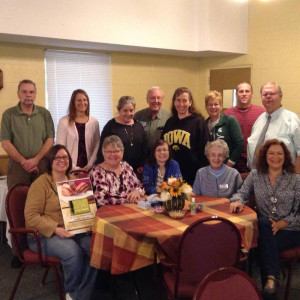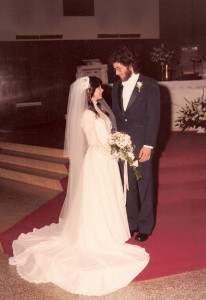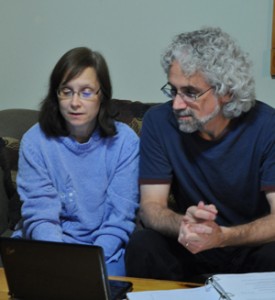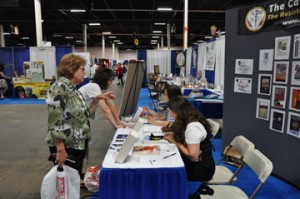From the President’s Desk – Success, Faithfulness and Farewell
At the 2015 Catholic Writers Retreat in Michigan!
Happy Thanksgiving! I hope everyone had a wonderful feast yesterday.
Catholic Writers Retreat: I’d like to thank all the attendees, presenters and organizers of the Catholic Writers Retreat. We all had a wonderful time writing, praying and socializing! Special thanks to Margaret Realy for organizing this wonderful event.
Blessed Mother Teresa once said, “We are not called to be successful. We are called to be faithful.”
In about four days, I will no longer be president of the Catholic Writers Guild so this will be my last “From the President’s Desk” post.
When I first discovered the Catholic Writers Online group, and later, the Catholic Writers Guild, I truly felt like I had come home. I was so happy to be a part of a group of faithful Catholic writers. I hadn’t really thought much about “success.” I just wanted to write. And I just wanted to be faithful to my Catholic faith. At the time, there were only about 40 members of the Guild. In the eight years since I’ve been a active member, our membership has grown to over 500 members.
When I was asked to run as vice president in 2010, I readily agreed. Later, when I was asked to run for president, after a short discernment process, I readily agreed. Of course, I had no idea what was in store for me. Being president of this non-profit, mostly volunteer organization has had its share of challenges, but I’ve learned so much and I’ve gained many lifelong friendships.
I owe a tremendous gratitude to everyone in the Guild. Thanks especially to Ann Margaret Lewis (founding member and past president), who was always available to listen when I needed to chat, Karina Fabian (original president of the Guild), and the current members of the board: Dave Shaw (secretary), Karl Erickson (treasurer), Nancy Ward (committee coordinator), and Arthur Powers (VP and founding member).
Although I joined the Guild to be with like-minded faithful Catholic writers, I was surprised to find that much of what I’ve learned from Guild members over the past eight years has contributed to whatever “success” I’ve been fortunate to have. In the early years, I attended online conferences and chats. Later, I attended and helped to organize the live conferences. The success I’ve had as a writer has been the direct result of my involvement with the Guild. My books have been collectively downloaded over 625,000 times on Kindle. All of my novels have spent time on various Amazon Kindle bestsellers’ lists (In 2012, my novel, Stealing Jenny, was either #1 or #2 in several categories for 40 weeks of that year). I’ve been on EWTN’s Bookmark three different times and other TV and radio shows. And I’m actually making a modest supplemental income from my novels.
That success aside, my time as the president of the Guild, has been spent being faithful not only to the magisterium of the Catholic Church, but also to the values of our wonderful organization.
I won’t be leaving the Guild, however! I intend to remain on two very busy committees: the Seal of Approval and the Live Conference committees. I have a new job as the marketing director for a wonderful Catholic apostolate that promotes the regular practice of fasting. I write for the Live the Fast blog and newsletter; I write press releases and, best of all, from my regular practice of fasting, I’ve grown stronger in my faith (and even lost 10 pounds!).
Fellow CWG member and New Jersey native, Joe Wetterling, will be your new president. I’ve worked with Joe on three different committees. Besides being witty and knowledgeable about a variety of topics, Joe is level-headed and dependable. A little bit about Joe, in case you don’t know him:
Joe Wetterling is a professional educator and writer. During the day, his work includes performance improvement, technical training, and editing for the Temple University Health System. At home, Joe teaches the faith at his blog Ho Kai Paulos, comments on religious themes in fantasy and sci-fi at Baptized Imagination, and makes everything relate to Latin while helping homeschool his son. He’s a member of the Militia Immaculata. At the Catholic Writers Guild, Joe participates in blog editing, the Seal of Approval review process, and the CALA. Learn more about him at JoeWetterling.com.
Please take a moment over the next several weeks to welcome Joe to this challenging — yet fulfilling — position.
It has been my privilege and honor to serve as your president for three years and to serve on the Catholic Writers Guild board for five years. I look forward to continuing to be a part of this wonderful organization.
In Jesus and Mary,
Ellen Gable Hrkach








![MC900434910[1]](http://blog.catholicwritersguild.com/wp-content/uploads/2014/10/MC9004349101.png)





